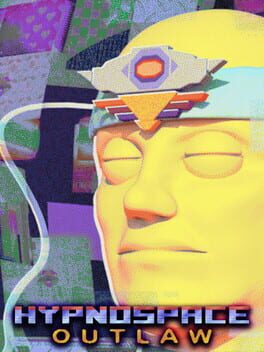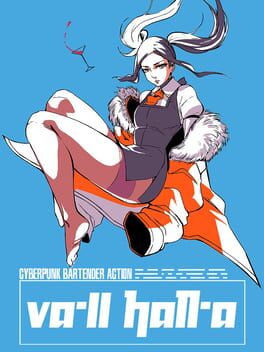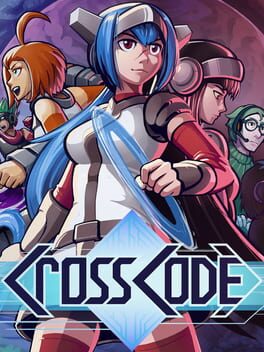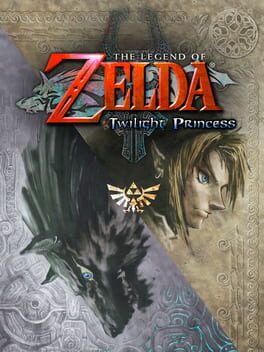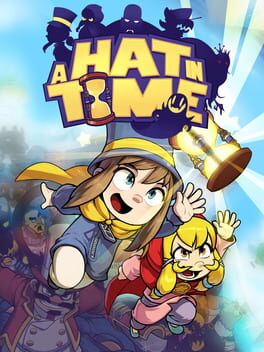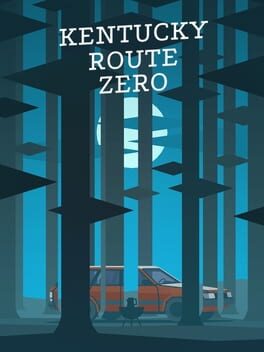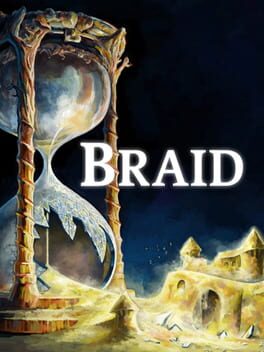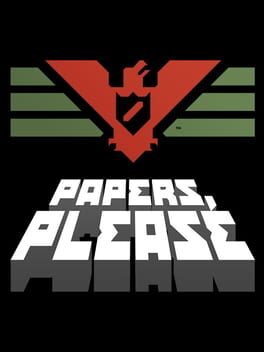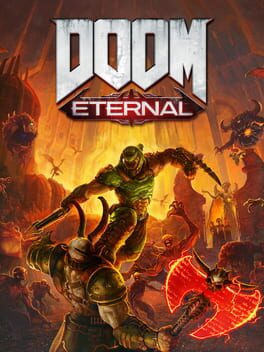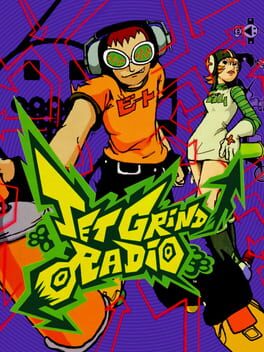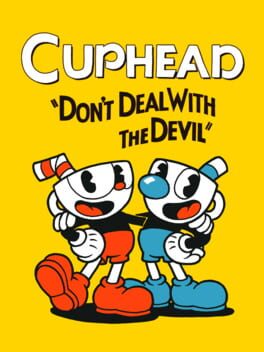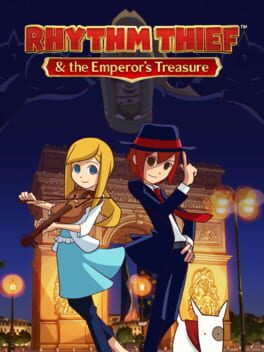chump
2019
Covertly one of the most well put-together worlds ever. Not a single pixel feels as though it doesn't directly contribute to characterizing Hypnospace, and the end result is a genuinely evocative encapsulation of the old Internet, of observation without participation, of the ways that humans respond to changing technology, and of communication as a whole. I can't fathom a more realistic portrayal of how Hypnospace would have turned out if it really existed, and combing through it to uncover its secrets was some of the most fulfilling exploration I've ever experienced. It's really hard to put into words how special this game is. An absolute titan of passion, creativity, and authenticity that deserves to go down as an all-time indie great.
Pretty much everything I hate about video game writing wrapped up in one package. Constant callbacks to jokes that weren't funny in the first place, out of place references to memes and pop culture, anime-esque mannerisms and personality traits, sex being brought up so frequently that things just become unbearably awkward, you name it. There are some decent nuggets of worldbuilding in here, but they're absolutely not worth weeding through the terrible dialogue to find. Speaking of the dialogue, that's all the game is. I'm sure how you prepare the drinks has an impact on the story seeing as there are multiple endings, but it sure doesn't feel like anything in the game actually responds to your decisions when you're playing, and I'm not going to sit through it again to try to find out. It offends me that this game thinks it's worthy of making multiple references to Seinfeld.
2018
I feel like it's a love it or hate it kind of game. It's also a really difficult game to criticize. If you have a problem with how long the game is, how most of its quests feel like generic, disconnected busywork, or how its sense of constant progression is too manipulative to be considered well designed, then that's fair. But if you were to say that any of these things were faults, someone else could just as easily argue that you're missing the point and they actually succeed in their true purpose of characterizing the MMO that the game takes place in, which is exactly the side of the fence that I'm on. CrossCode is the rare indie game that establishes a unique concept and actually ends up delivering on it. The game takes advantage of nearly everything that it establishes. The emphasis on convenience that evolves naturally from its MMO influence fits like a glove around its action RPG gameplay. Its mechanics are absolutely rock-solid from the very get-go, and there's never a single second where they aren't being expanded on in every direction. I wasn't crazy about the story- I thought it was pretty predictable and I never really found myself liking any of the characters all that much, but it's hard to deny how ambitious it is. It's got a really unique tone to it that I couldn't really see being pulled off without its particular setting, and it does reach towards some potentially interesting themes, although it doesn't flesh them out as much as I'd like it to.
I know I said that it's a difficult game to criticize, but I'm gonna try to do it anyway. The game's emphasis on convenience starts becoming a con most notably when your party members never end up feeling like real people. They respond to you instantly even when they're in the middle of something that requires a decent amount of focus, they hardly ever die, and they accept you as their leader no matter the circumstances- why would this ever happen in an MMO if I'm at a lower level than you and can't even talk? Aside from that, the game decides to absolutely neuter its pacing about 85% of the way through, which is a decision that doubly goes against what makes CrossCode a great game in the first place- it doesn't make sense contextualized either in its MMO world or outside of it.
I know I said that it's a difficult game to criticize, but I'm gonna try to do it anyway. The game's emphasis on convenience starts becoming a con most notably when your party members never end up feeling like real people. They respond to you instantly even when they're in the middle of something that requires a decent amount of focus, they hardly ever die, and they accept you as their leader no matter the circumstances- why would this ever happen in an MMO if I'm at a lower level than you and can't even talk? Aside from that, the game decides to absolutely neuter its pacing about 85% of the way through, which is a decision that doubly goes against what makes CrossCode a great game in the first place- it doesn't make sense contextualized either in its MMO world or outside of it.
What made Ocarina of Time so special? I don't have a good answer to that question, and neither did Nintendo in 2006. Most people would agree that Link meeting Zelda for the first (and pretty much only) time in the castle courtyard is where Ocarina really hits its stride, but trying to discern why that moment sticks out is much more difficult. The most obvious potential answer to this is its brevity- the game's called 'The Legend of Zelda,' so the fact that your encounter with Zelda herself is so fleeting has to leave a pretty big impression, right? Evidently not, since Twilight Princess only goes this far and ultimately ends up leaving Link's meetings with this iteration of Zelda void of substance and rendering her a complete non-character. This pretty much represents Twilight Princess as a whole- it's a by the book Zelda game with only a shallow understanding of what makes the book good in the first place.
Ocarina of Time presents its conflict in the most natural way possible. The player literally gets to play through what happens if Link doesn't end up completing his quest, motivating the player in a way no textbox possibly could. In Twilight Princess's Hyrule there's a clear conflict but the fallout doesn't impact anything the player does whatsoever. The only event that could be seen as working towards making the world feel like it needs to be saved is the children getting captured, but frankly it's not like that couldn't have happened if not for the Twilight Realm shenanigans. Castle Town is the most jovial, bustling location the series has ever seen and its residents are completely unfazed by the castle being captured. The group that meets up at Telma's bar just baffles me since it seems like they should be the ones who are actually aware of what's going on, but instead, each member just happens to be researching something independently that ends up leading Link to the next dungeon.
Zelda isn't a dungeon crawler, it's an overworld crawler. Don't get me wrong, Zelda dungeons can be fun or even highlights of the game, but the focus has been on the overworld since the very beginning of the series, and for good reason- if having to scour everything above ground is the bulk of the game then it just makes reaching the most unexplored corners of the world that much sweeter. Twilight Princess treats the overworld in the least Zelda-like manner possible: as means to an end. In my opinion it shouldn't be possible to finish one dungeon and immediately walk into the railroad to the next one without any interaction with the overworld, at least not without a complete overhaul of the formula that Twilight Princess certainly doesn't commit to.
Twilight Princess's dungeon design is largely considered its biggest strength, but I only find myself agreeing halfway. Although the game's dungeons aren't particularly close to being my favorite in the series from a mechanical perspective, I can't deny that they all stand out from a memorability perspective. If I never replayed any Zelda games ever again, I'm pretty sure I'd remember walking along magnetic surfaces with the iron boots or obtaining the boomerang from a possessed orangutan or the fact that one of the dungeons just takes place in a character's house over pretty much anything from any other dungeon in the series. The game clearly succeeds in what it's going for here, even if it wouldn't be my first choice for a dungeon design philosophy.
There's also some smaller flaws that strike me as completely baffling. They don't even attempt to do anything interesting with Wolf Link and Midna's leaping ability is probably the most insulting mechanic Zelda has ever had for reasons I shouldn't have to explain. The spinner is far and away the most unique item the series has ever seen but it gets relegated to contextual use only. The game introduces two separate adjacent worlds to Hyrule but doesn't allow you to talk to the residents of either one. Zant's non-character further solidifies Skull Kid as the only great villain that the series has ever had, and Midna's personality death is honestly even more egregious than Tetra's in my opinion.
Aside from generally enjoying the dungeons the things I appreciate about this game are relatively minor. Jovani, Agitha, and the hidden skills are all some of the better collection quests that the series has had, and I genuinely appreciate the amount of Rupee sinks that were put in this time around. The terrain is varied enough so that each region actually feels pretty distinct despite most of the map just being Hyrule Field, with the standout being Zora's Domain. Malo Mart. I don't have to mention that the music is stellar as usual. This was the only Zelda game that I intentionally avoided initially (for a reason that now seems silly, me just thinking it looked ugly visually) but I'm really glad that I played it in a post Breath of the Wild world. I don't hate Twilight Princess, but I think it was a step backwards for the series, and I'm relieved that the Twilight Princess -> Skyward Sword trajectory ended before it received a third entry. But then again I guess that means I'll never find out what made Ocarina so special. Poo tee weet.
Ocarina of Time presents its conflict in the most natural way possible. The player literally gets to play through what happens if Link doesn't end up completing his quest, motivating the player in a way no textbox possibly could. In Twilight Princess's Hyrule there's a clear conflict but the fallout doesn't impact anything the player does whatsoever. The only event that could be seen as working towards making the world feel like it needs to be saved is the children getting captured, but frankly it's not like that couldn't have happened if not for the Twilight Realm shenanigans. Castle Town is the most jovial, bustling location the series has ever seen and its residents are completely unfazed by the castle being captured. The group that meets up at Telma's bar just baffles me since it seems like they should be the ones who are actually aware of what's going on, but instead, each member just happens to be researching something independently that ends up leading Link to the next dungeon.
Zelda isn't a dungeon crawler, it's an overworld crawler. Don't get me wrong, Zelda dungeons can be fun or even highlights of the game, but the focus has been on the overworld since the very beginning of the series, and for good reason- if having to scour everything above ground is the bulk of the game then it just makes reaching the most unexplored corners of the world that much sweeter. Twilight Princess treats the overworld in the least Zelda-like manner possible: as means to an end. In my opinion it shouldn't be possible to finish one dungeon and immediately walk into the railroad to the next one without any interaction with the overworld, at least not without a complete overhaul of the formula that Twilight Princess certainly doesn't commit to.
Twilight Princess's dungeon design is largely considered its biggest strength, but I only find myself agreeing halfway. Although the game's dungeons aren't particularly close to being my favorite in the series from a mechanical perspective, I can't deny that they all stand out from a memorability perspective. If I never replayed any Zelda games ever again, I'm pretty sure I'd remember walking along magnetic surfaces with the iron boots or obtaining the boomerang from a possessed orangutan or the fact that one of the dungeons just takes place in a character's house over pretty much anything from any other dungeon in the series. The game clearly succeeds in what it's going for here, even if it wouldn't be my first choice for a dungeon design philosophy.
There's also some smaller flaws that strike me as completely baffling. They don't even attempt to do anything interesting with Wolf Link and Midna's leaping ability is probably the most insulting mechanic Zelda has ever had for reasons I shouldn't have to explain. The spinner is far and away the most unique item the series has ever seen but it gets relegated to contextual use only. The game introduces two separate adjacent worlds to Hyrule but doesn't allow you to talk to the residents of either one. Zant's non-character further solidifies Skull Kid as the only great villain that the series has ever had, and Midna's personality death is honestly even more egregious than Tetra's in my opinion.
Aside from generally enjoying the dungeons the things I appreciate about this game are relatively minor. Jovani, Agitha, and the hidden skills are all some of the better collection quests that the series has had, and I genuinely appreciate the amount of Rupee sinks that were put in this time around. The terrain is varied enough so that each region actually feels pretty distinct despite most of the map just being Hyrule Field, with the standout being Zora's Domain. Malo Mart. I don't have to mention that the music is stellar as usual. This was the only Zelda game that I intentionally avoided initially (for a reason that now seems silly, me just thinking it looked ugly visually) but I'm really glad that I played it in a post Breath of the Wild world. I don't hate Twilight Princess, but I think it was a step backwards for the series, and I'm relieved that the Twilight Princess -> Skyward Sword trajectory ended before it received a third entry. But then again I guess that means I'll never find out what made Ocarina so special. Poo tee weet.
Even the most optimistic of us don't deny that games are time wasters to some degree, and a lot of games out there exhaust so much energy just in trying to prove that they're not. Flower, Sun, and Rain acknowledges this and goes in the complete opposite direction, one of its recurring patterns, with its decision to include a step counter as a permanent component of its UI. Not only does the game refuse to put anything of note in its long-winded and visually hideous corridors but it also refuses to let you forget just how much time you've spent in them. It's a ridiculously efficient way to taunt the player (and this is before you even consider that it's used as a milestone to unlock "upgrades" for Sumio) but it's also the most interesting thing the game does.
I've long since accepted the reality that all anything has to do to be considered an art game is be Not Fun, but even the driest arthouse films constantly give the audience something new to chew on, which this game doesn't do. It's adamant about never allowing its puzzles to evolve, which I suppose I understand from a thematic perspective, but this doesn't mean it had to restrict itself in every other area. The most fulfilling part of playing this game was trying to figure out why they included a step counter, and once I was finished with that it didn't really feel like there was much for me left.
The most impressive thing it does late-game is the gradual disappearance of its ensemble cast. One moment you can't even get outside without being pestered with one of their problems and the next the universe feels jarringly empty- almost like the day after a large group has checked out of some sort of hotel or something. Combine this with the fact that the game has a character list detailing each one's background and personality, presumably so players can "check their notes" as if playing a traditional mystery game, and it becomes downright genius, but it's not enough to carry the back half of the game.
It's a deconstruction. I get it. I got it after the first few days went by, I got it when a character straight-up told me that his dialogue was a flag to trigger a new event, I got it when the gameplay devolved into gradeschool math homework, I got it when the credits rolled. It's a deconstruction, but it's not a great one.
I've long since accepted the reality that all anything has to do to be considered an art game is be Not Fun, but even the driest arthouse films constantly give the audience something new to chew on, which this game doesn't do. It's adamant about never allowing its puzzles to evolve, which I suppose I understand from a thematic perspective, but this doesn't mean it had to restrict itself in every other area. The most fulfilling part of playing this game was trying to figure out why they included a step counter, and once I was finished with that it didn't really feel like there was much for me left.
The most impressive thing it does late-game is the gradual disappearance of its ensemble cast. One moment you can't even get outside without being pestered with one of their problems and the next the universe feels jarringly empty- almost like the day after a large group has checked out of some sort of hotel or something. Combine this with the fact that the game has a character list detailing each one's background and personality, presumably so players can "check their notes" as if playing a traditional mystery game, and it becomes downright genius, but it's not enough to carry the back half of the game.
It's a deconstruction. I get it. I got it after the first few days went by, I got it when a character straight-up told me that his dialogue was a flag to trigger a new event, I got it when the gameplay devolved into gradeschool math homework, I got it when the credits rolled. It's a deconstruction, but it's not a great one.
2017
It's a subpar platformer propped up by about a dozen coats of polish. After thinking about it, my main issue is with the game's moveset which, although it may seem to be the opposite at a surface level, is actually pretty restrictive. Let me put it this way. In the air, you have three options: a double jump, a dive, and a flip. However, the flip can only be done directly after a dive, and the double jump can't be done if you've already used a dive. What this means is that if you want to use all of your moves in a single jump, there's only one order you can do them in: double jump -> dive -> flip. This ends up making it so that jumps can't be designed in a way that would require you to use your moves in a different order, leading to just the same set of inputs over and over again for the entire game. What's more inexcusable is the fact that it doesn't even attempt any original mechanics, it's all just so basic. Moving platforms, springs, ropes to swing on, there's nothing new here to figure out. Combine this with the poor moveset and it creates a perfect storm of frustratingly low difficulty. I'd have a hard time believing anyone who has played a 3D platformer before would struggle with any part of this game, and it's not like it even punishes you for dying in the first place. To top it off there's also the badge and yarn systems. Neither of them are well-thought-out at all and their usefulness as collectables ends after about a fifth of the game, which ends up making them feel like huge misses in an understanding of what makes these types of games good.
The counterargument to my thoughts here would be that the game isn't supposed to be a platformer first and foremost and instead an adventure game where the main appeal is reaching varied environments and meeting a unique cast of characters, but I'd disagree with this as well. Something like Psychonauts or Super Mario Galaxy puts the actual platforming in the backseat in favor of interesting experiences, which I'm fine with, but A Hat in Time goes even further and ends up crossing a line. The platforming here feels like a formality, like the sequence of events was thought up first and the platforming is just there to fill in the gaps. Pyschonauts has unique mechanics depending on whose brain you're currently occupying, and Super Mario Galaxy consistently uses its outer space setting to vary up the gameplay. Take away the presentation from A Hat in Time and every world is the exact same, and that's my bottom line. The particle effects, the loading screen art and other 2D assets, the soundtrack, the UI. It's all fantastic but none of it works in service of the goal of creating a good platformer.
The counterargument to my thoughts here would be that the game isn't supposed to be a platformer first and foremost and instead an adventure game where the main appeal is reaching varied environments and meeting a unique cast of characters, but I'd disagree with this as well. Something like Psychonauts or Super Mario Galaxy puts the actual platforming in the backseat in favor of interesting experiences, which I'm fine with, but A Hat in Time goes even further and ends up crossing a line. The platforming here feels like a formality, like the sequence of events was thought up first and the platforming is just there to fill in the gaps. Pyschonauts has unique mechanics depending on whose brain you're currently occupying, and Super Mario Galaxy consistently uses its outer space setting to vary up the gameplay. Take away the presentation from A Hat in Time and every world is the exact same, and that's my bottom line. The particle effects, the loading screen art and other 2D assets, the soundtrack, the UI. It's all fantastic but none of it works in service of the goal of creating a good platformer.
2013
Interactive fiction: it's probably the most misleading title of a video game genre, since there's hardly anything at all interactive about selecting between a handful of pre-written story tracks. In most cases, you can't experience a piece of interactive fiction differently than how you can experience a piece of traditional fiction, which is a disconnect that Kentucky Route Zero does its best to fix. For its entire runtime, the game is written in a way that's difficult to not at least respect. It doesn't attempt any cheap narrative gimmicks, it doesn't become explicitly meta at any point, and, most importantly, it never gives the player the impression that any decision made will alter the story's sequence of events. A lesser piece of interactive fiction would question whether or not decisions without at least the illusion of consequence are worth including, but Kentucky Route Zero has a polar opposite philosophy.
It's no coincidence that the game seems to have a fixation on museums, because in many ways, it is one. The museum itself is only there to house the exhibits and point you towards them- what you actually get out of the exhibits is entirely up to you. Kentucky Route Zero is a collection of experiences in the same way that a museum is a collection of exhibits, and, using this line of thinking, it's clear why it was divided into an act/scene structure. It also expands this stage play notation to the dialogue, where most of the choices have the player picking lines for characters to say. This is where the game's genius lies. If the majority of other interactive fiction games can be called "reading simulators" then Kentucky Route Zero is surely a "writing simulator." You can have characters explain their backstories or display their personalities in various different ways, and the only real motivation for what choice to make is what the most appropriate next line for the story would be. Just like looking at an exhibit in a museum, it's totally up to the player how exactly each story beat is experienced, and I think a lot of people will find themselves unable to rationalize why they made certain decisions, like withholding what could've been important information to have a character comment on something trivial. Clearly, one of the game's major goals was to make the audience as much of a participant as the author, and that's where it's most successful.
I found it fascinating from a logistical standpoint for its entire duration, but in terms of its actual contents, I only really felt hooked through Act I. I get that the events are supposed to be disjointed, I get that abstraction's the point here, and maybe the game's ultimately just not for me, but I really would've liked at least some concrete plot through-lines. The mystery of the Zero itself could've served this purpose, and maybe the game could've held off on the player actual visiting it until later on in the story, but perhaps I'm just being nearsighted. It's a museum, and that's an artistic choice that I greatly admire, but maybe it's a little too content in just being a museum. Overall, it's a deeply pretentious game, in a good way. It's confident that it's an important work, one that'll resonate with its audience enough to be remembered long after its contemporaries. And I hope it's right.
It's no coincidence that the game seems to have a fixation on museums, because in many ways, it is one. The museum itself is only there to house the exhibits and point you towards them- what you actually get out of the exhibits is entirely up to you. Kentucky Route Zero is a collection of experiences in the same way that a museum is a collection of exhibits, and, using this line of thinking, it's clear why it was divided into an act/scene structure. It also expands this stage play notation to the dialogue, where most of the choices have the player picking lines for characters to say. This is where the game's genius lies. If the majority of other interactive fiction games can be called "reading simulators" then Kentucky Route Zero is surely a "writing simulator." You can have characters explain their backstories or display their personalities in various different ways, and the only real motivation for what choice to make is what the most appropriate next line for the story would be. Just like looking at an exhibit in a museum, it's totally up to the player how exactly each story beat is experienced, and I think a lot of people will find themselves unable to rationalize why they made certain decisions, like withholding what could've been important information to have a character comment on something trivial. Clearly, one of the game's major goals was to make the audience as much of a participant as the author, and that's where it's most successful.
I found it fascinating from a logistical standpoint for its entire duration, but in terms of its actual contents, I only really felt hooked through Act I. I get that the events are supposed to be disjointed, I get that abstraction's the point here, and maybe the game's ultimately just not for me, but I really would've liked at least some concrete plot through-lines. The mystery of the Zero itself could've served this purpose, and maybe the game could've held off on the player actual visiting it until later on in the story, but perhaps I'm just being nearsighted. It's a museum, and that's an artistic choice that I greatly admire, but maybe it's a little too content in just being a museum. Overall, it's a deeply pretentious game, in a good way. It's confident that it's an important work, one that'll resonate with its audience enough to be remembered long after its contemporaries. And I hope it's right.
2008
I'll come right out and say that I think Braid is a great game. It introduces all of its mechanical building blocks right out of the gate, it teaches you all the quirks of each world's unique gimmick about as naturally as possible, and it makes you assemble all the knowledge you've gained by yourself in order to solve each puzzle, which parallels assembling the in-game jigsaw pieces yourself even after you've collected them. It doesn't push any of its mechanics as far as it could have, but it covers a really respectable amount of breadth for each one despite its very short runtime. I found myself fulfilled by every single puzzle solution and excited to find out what each world's new mechanic would be, which I truly don't think I can say about any other puzzle game.
Braid also has a story. But we shouldn't talk about that, since everyone agrees with me in that story in video games doesn't really matter, right? Just making sure, nobody actually took Braid's story seriously, right? Guys?
Braid also has a story. But we shouldn't talk about that, since everyone agrees with me in that story in video games doesn't really matter, right? Just making sure, nobody actually took Braid's story seriously, right? Guys?
2013
It's an absolutely perfect adaptation to game mechanics from something that isn't a game. First you're taking your time, looking up everything in the guidebook to make sure you make no mistakes. Then you're strategizing about which rule checks are worth skipping because they take too long to warrant worrying about the fine they might cost you. Before you know it, it's second nature. You know that Bostan is in Republia and that the line on the MOA emblem goes diagonally from bottom left to top right. On top of this, the game is so good at increasing its complexity- each new rule fits in flawlessly with the existing mechanics, with the difficulty curve, and with the story events.
Like any great game, it feels worth mastering, but it by no means stops there, because you're in Arstotzka, a world where you're never commended for doing anything correctly, only reprimanded for doing things incorrectly. A world where you're fined heavily for the act of decorating your workspace. A world where conducting an X-ray to verify someone's sex and seizing someone's passport without any real justification aren't gross violations of rights but simply burdens, items on a checklist that must be done. Ultimately, Papers, Please is about being molded into thinking, acting, and making decisions like a robot. Come across a moral dilemma and you'll more than likely make your choice on whether or not to admit someone just based on if you've exceeded your protocol violation warning limit for the day. Human beings aren't human beings in Arstotzka, they're means to an end. Through this theme, not only does the game perfectly encapsulate both bureaucratic labor and authoritarian government as a whole, but it comes to the conclusion that no other game with moral dilemmas has been able to quite reach. When working as an immigration officer, there are no people. There are only sets of information which may or may not line up, the specific details of which are so irrelevant towards whether or not someone deserves to pass that they might as well be randomly generated.
And yet, somehow, the human side of Arstotzka shines through. Jorji is more than fine with playing the immigration game, applauding you for working such a difficult job whenever he's denied entry and vying to have more convincing papers next time. Calensk tells you that you'll earn a bonus for detaining more people, and yet he's unable to pay you fully the first few times because he had to spend more money taking care of his family than he anticipated. Even Dimitri, the man in charge of overseeing your position, the man who's forced you to become this robot, will give you a game over if you follow protocol and refuse to let one of his friends into the country. Like the rest of the game, this characterization is so effortlessly natural. The game's mechanics already made going back to get all the medals and endings worthwhile, but picking up on these details adds an additional, equally fulfilling layer. This all culminates in what I think is the high point of the entire game, and what's probably the most optimistic of the major endings. You've just grinded out nearly two-hundred credits to escape the country and are now at the hands Obristan's immigration officer with your family. But you're not denied entry, like you so very much deserve to be, you're let in. Why? Maybe the officer didn't notice your passports were forged, or maybe he inferred the situation that you were in and took mercy. Either way, it's because he's a human being, not a robot, and now your family's safe. Thanks for playing, roll credits.
Like any great game, it feels worth mastering, but it by no means stops there, because you're in Arstotzka, a world where you're never commended for doing anything correctly, only reprimanded for doing things incorrectly. A world where you're fined heavily for the act of decorating your workspace. A world where conducting an X-ray to verify someone's sex and seizing someone's passport without any real justification aren't gross violations of rights but simply burdens, items on a checklist that must be done. Ultimately, Papers, Please is about being molded into thinking, acting, and making decisions like a robot. Come across a moral dilemma and you'll more than likely make your choice on whether or not to admit someone just based on if you've exceeded your protocol violation warning limit for the day. Human beings aren't human beings in Arstotzka, they're means to an end. Through this theme, not only does the game perfectly encapsulate both bureaucratic labor and authoritarian government as a whole, but it comes to the conclusion that no other game with moral dilemmas has been able to quite reach. When working as an immigration officer, there are no people. There are only sets of information which may or may not line up, the specific details of which are so irrelevant towards whether or not someone deserves to pass that they might as well be randomly generated.
And yet, somehow, the human side of Arstotzka shines through. Jorji is more than fine with playing the immigration game, applauding you for working such a difficult job whenever he's denied entry and vying to have more convincing papers next time. Calensk tells you that you'll earn a bonus for detaining more people, and yet he's unable to pay you fully the first few times because he had to spend more money taking care of his family than he anticipated. Even Dimitri, the man in charge of overseeing your position, the man who's forced you to become this robot, will give you a game over if you follow protocol and refuse to let one of his friends into the country. Like the rest of the game, this characterization is so effortlessly natural. The game's mechanics already made going back to get all the medals and endings worthwhile, but picking up on these details adds an additional, equally fulfilling layer. This all culminates in what I think is the high point of the entire game, and what's probably the most optimistic of the major endings. You've just grinded out nearly two-hundred credits to escape the country and are now at the hands Obristan's immigration officer with your family. But you're not denied entry, like you so very much deserve to be, you're let in. Why? Maybe the officer didn't notice your passports were forged, or maybe he inferred the situation that you were in and took mercy. Either way, it's because he's a human being, not a robot, and now your family's safe. Thanks for playing, roll credits.
2020
Over these past few years, Bethesda has managed to make "rip and tear" synonymous with Doom, but even that slogan's misleading at this point. The original (uh, original reboot, not original original) Doom embraced this mantra more faithfully- while it did suffer from some seriously misplaced modernization, most of it was pretty ignorable and the action, propped up by the smart new glory kill mechanic, more than made up for it. It also had our hero in a Gordon Freeman-esque scenario, in the midst of a world-altering catastrophe with his only goal survival and escape by any means necessary. Now we're galaxy trotting, forgoing the natural sense of progression that comes with just moving from place to place in favor of teleporting in from a hub world with the help of an omniscient AI as we retrieve MacGuffin after MacGuffin. There's an expanded codex filled with fresh word salad if you want to learn the significance of any of what you're doing, there's also a flamethrower now, there's an ice bomb, there's monkey bars, there's a huge glowing sword, there's about two dozen new upgrade systems. The big question is, do any of these additions make it a better action game than its predecessor? My answer is no.
I've come to realize that what I liked most about Doom 2016's encounters is that they felt like endurance tests. They were long and drawn out but truly felt like they forced you to use all of your resources to come out successfully. Eternal's feel shorter by comparison, and a lot of the time I found myself finishing one only having used a few of my weapons. 2016 had me constantly creating new strategies- I remember always saving my rockets for Cacodemons and plasma for Revenants- but I didn't really find myself choosing my weapon based on which demon I was fighting in Eternal. It also feels too easy to make a clean getaway. You'll never catch me calling additional movement options a flaw, but the demons don't really have any way to deal with the fact that you have two dashes and consistent ways to get tons of airtime. What's probably my biggest gripe is that the newly added abilities never ended up flowing. Throughout my playthrough the only time I'd ever use the Flame Belch or the Blood Punch was when I mentally reminded myself to. It never felt natural or instinctual, and on top of this I could never remember which of my abilities were on a cooldown or which recharged with glory kills. At first I just chalked this up to me being pretty lousy at shooters but the copious amount of tips the game throws at you began to make me think otherwise. It feels like you're reminded to check the automap, to use a specific weapon on a specific enemy, or to spend your upgrade tokens at such a constant rate that at some point you have to wonder if this increased complexity is really worth it. I'd still rather replay Doom 1993 than any of its sequels or reboots, and its simplicity is largely to thank for that. But then again, are you truly ripping and tearing if you're not logged into your Bethesda.net account?
I've come to realize that what I liked most about Doom 2016's encounters is that they felt like endurance tests. They were long and drawn out but truly felt like they forced you to use all of your resources to come out successfully. Eternal's feel shorter by comparison, and a lot of the time I found myself finishing one only having used a few of my weapons. 2016 had me constantly creating new strategies- I remember always saving my rockets for Cacodemons and plasma for Revenants- but I didn't really find myself choosing my weapon based on which demon I was fighting in Eternal. It also feels too easy to make a clean getaway. You'll never catch me calling additional movement options a flaw, but the demons don't really have any way to deal with the fact that you have two dashes and consistent ways to get tons of airtime. What's probably my biggest gripe is that the newly added abilities never ended up flowing. Throughout my playthrough the only time I'd ever use the Flame Belch or the Blood Punch was when I mentally reminded myself to. It never felt natural or instinctual, and on top of this I could never remember which of my abilities were on a cooldown or which recharged with glory kills. At first I just chalked this up to me being pretty lousy at shooters but the copious amount of tips the game throws at you began to make me think otherwise. It feels like you're reminded to check the automap, to use a specific weapon on a specific enemy, or to spend your upgrade tokens at such a constant rate that at some point you have to wonder if this increased complexity is really worth it. I'd still rather replay Doom 1993 than any of its sequels or reboots, and its simplicity is largely to thank for that. But then again, are you truly ripping and tearing if you're not logged into your Bethesda.net account?
2021
Lack of consequence is the real killer here. While the EMMI encounters are pretty enjoyable to navigate, the fact that you're given an automatic checkpoint before and after you enter each one of their areas negates the majority of their potential. When getting caught by one barely inconveniences you, there's no tension or fear, let alone any dread. The worst part is that the standard Metroid save system would've worked perfectly for these sections, which makes it one of the most frustrating changes to an existing formula I've come across recently. Just imagine how thrilling landing an escape parry would've been if the threat of losing progress loomed over your every move. Beyond that it's your standard Metroid game, but with all the ups and downs that come with modernization. I guess it was foolish of me to hope that the storytelling through gameplay that the series has historically excelled at would continue into the modern age, since Dread's story is told entirely through cutscenes and text boxes. As chatty as Fusion is, wordlessly stumbling across Ridley's frozen body is one of my favorite moments in the entire series- Dread never attempts anything similar. The game also has the tendency to "let you out" right in front of where you're supposed to go next whenever you get an upgrade or fight a boss, meaning it's only possible to get really lost if you purposefully get yourself lost, which I can see rubbing some people the wrong way. Ultimately, this one gets a "worth playing" from me due to some changes that make the world pretty fun to traverse, like the new mobility options and improved elevator system, but more importantly the presentation. The backgrounds are especially well done- they're so detailed and they really do great work to make the areas feel distinct and alive in a way that the older games in the series couldn't capture. But there were also some small decisions that really caught my eye. Samus being the only source of light in a save room before she saves. The loading screens being silent, wordless cinemagraphs. The map being divided into much smaller squares than usual, making it impossible to reach most tiles until you get some upgrades, which mimics the entire Metroid concept. That's what I want to see more of.
2000
I'm not sure what's more insane, the fact that this was pretty much Naganuma's first soundtrack or the fact that he hasn't really done much after this came out. But everyone already knows how much of a stylistic gem Jet Set Radio is, so instead I'll go into some of the lesser appreciated details that makes it a great game and try to keep my humming the bassline to a minimum. It's a game that sucks until you're good at it, which is probably the best kind of game there is. It's a real shame that the definition of "intuitive" has switched to "stuff that I get instantly" from "stuff I can pick up on easily," because I much prefer the latter. I really don't want to know everything right off that bat- the act of learning how to do things is what I'm interested in, and is one of the biggest reasons why I like video games as a medium in the first place. Jet Set Radio's rival encounters aren't only an engaging way to make you feel like you're expanding the size of your gang but also a clever method of cluing you in to shortcuts and tricks that you might not have figured out yourself. It's really fulfilling to observe them in a contained setting and then try them out in a real mission, and it's also exactly how watching someone else skate would play out in real life. The maps are initially given to you in bits and pieces, making it satisfying to use your full mastery of the physics and controls during the final few missions which each contain a full map instead of just a section. DJ Professor K is also a particularly genius inclusion. He's great at establishing and then perpetuating the level of energy that the game requires, but more importantly narrates in an aggressively present tense, propping up the setting and your active role in the story in a way you really don't see that often. I like this game too much to do anything but gloss over its pretty glaring problems. The enemies and health system are underdeveloped (they're hazards more than enemies and most of the time your best option is just tanking damage), there's a decent amount of technical problems (there's zero difference between walls you can and can't wall run on), and one really misplaced flashback section (not to mention the lamest final boss ever conceived). By all accounts, it meets my definition of a flawed masterpiece. But who cares? ROCK THAT SHIT, HOMIE!
2017
Outspoken homages in video games have a tendency to be a surface-level reading of the source material, and the degree of authenticity that Cuphead commits to is the exception that proves this rule. Not only does it completely capture the look, sound, and overall sense of humor of rubberhose, but I was completely blown away by the attention to detail that's present here. The level entrances purposefully look like they're part of cels and not the painted overworld. Djimmi the Great's stage uses a miniature instead of a hand-drawn background. The audio for voices is so low in quality that every character sounds threatening. The title screen is ominous and drawn in a more realistic style than the rest of the game. I'm sure I missed tons of other little things that only animation aficionados would be able to pick up on, but the best part is that the style completely works in favor of the boss fight format. Most bosses that follow the multiple phase formula don't really have a good reason to do so, but Cuphead has the perfect reason: embracing the 1930s mentality of just having a desire to experiment and show off cool animation. The transformations that every boss goes through when transitioning through phases make it so that each one is its own little story, which is a great motivator to push forward and more than justifies the game's difficulty. The graphic that shows your level progress after you die supplements the feeling of getting a tiny bit further towards your goal each try, and of course all of these efforts would've been completely wasted if the character designs weren't as excellent as they are.
As for the bosses themselves, it feels like the goal is to outlast them rather than to defeat them, since you almost always deal damage constantly throughout every fight. The only skill you really learn over the course of the game is keeping track of an increasing number of hazards at once, which I'd say works in the game's favor since every object is cleverly contextualized (and nice to look at, of course), but I definitely wish there was more to it. There's something to be said for the straightforward simplicity that the gameplay embraces, especially when the visuals are anything but simple, but it would've been great if there was some strategy besides shooting until you fill your meter and then using your super. The different weapons feel like self-explanatory tools rather than ways to expand the gameplay- use the chaser when there's a phase where the boss has little health but is hard to hit, use the spread when a boss is stationary and possible to get close to. The nonexistent feedback also discourages experimentation, as there's no real way to tell how much more damage one move does compared to another and you just have to take the game's word for it when it tells you something's strong. I've been critical of the lack of mechanical depth, but that's probably because it's the only area that doesn't match the ambition of the rest of the game. The Moldenhauer brothers absolutely deserve all the praise in the world for putting together something this inspired, this passionate, and it makes me unbelievably happy that they've found success. BRAVO!
As for the bosses themselves, it feels like the goal is to outlast them rather than to defeat them, since you almost always deal damage constantly throughout every fight. The only skill you really learn over the course of the game is keeping track of an increasing number of hazards at once, which I'd say works in the game's favor since every object is cleverly contextualized (and nice to look at, of course), but I definitely wish there was more to it. There's something to be said for the straightforward simplicity that the gameplay embraces, especially when the visuals are anything but simple, but it would've been great if there was some strategy besides shooting until you fill your meter and then using your super. The different weapons feel like self-explanatory tools rather than ways to expand the gameplay- use the chaser when there's a phase where the boss has little health but is hard to hit, use the spread when a boss is stationary and possible to get close to. The nonexistent feedback also discourages experimentation, as there's no real way to tell how much more damage one move does compared to another and you just have to take the game's word for it when it tells you something's strong. I've been critical of the lack of mechanical depth, but that's probably because it's the only area that doesn't match the ambition of the rest of the game. The Moldenhauer brothers absolutely deserve all the praise in the world for putting together something this inspired, this passionate, and it makes me unbelievably happy that they've found success. BRAVO!
2000
Third Final Fantasy I've played, and this one was a pretty big mixed bag for me, unfortunately. When it's on, it's really on. Although it doesn't attempt anything remotely as interesting as 6's prolific fusion of story and battle mechanics or 7's distinct, offbeat humor and interactive fiction elements, it's hard to deny that most of its story is anything less than a resounding success. What the game excels at most are character interactions. They're used expertly for both comedic and dramatic purposes- the naive Vivi being lectured by the just-as-naive-but-slightly-more-emotionally-intelligent Eiko on the other party members' relationships and the quiet bombshell question that Dagger drops on Zidane in Maiden Sari regarding his personal motivation were the respective standouts from my perspective. A bold decision that might not seem significant is the game's consistent willingness to cut characters out for hours at a time when they're not important to what's currently going on. Steiner, for example, is just gone for huge chunks of the story after being introduced, which really works well with the stage play motif that surrounds the game. Adding to this, the story also starts off as a briskly paced, wonderfully small scale sequence of events that mostly has the party traveling from interesting location to interesting location. The game's initially focused on having the characters learn about themselves, each other, and the conflict that they're currently involved in rather than learning how to defeat some intergalactic being.
But, in the end, despite how good the game is at getting your hopes up, it has Final Fantasy in the title. I don't care about Kuja's plan to merge the planets and kidnap the Sandy Claws or whatever. Despite eating up so much of the storyline it's simply not interesting, and it also takes what should be a quiet, personal narrative and regresses it into standard sci-fantasy schlock. This disappointing third act turn of events and also some weird, seemingly unfinished details like certain side characters being built up with zero payoff mean that the narrative isn't perfect, and therefore it has to lean on its gameplay to at least some degree. And man, maybe it's just me, but this game is just so unenthusiastic about being an RPG. What feels like the vast majority of fights, at least in the first half of the game, are scripted, mid-cutscene bouts that you're not really supposed to lose. The amount of time spent in areas containing random encounters is purposefully minimized. Trance is the only unique part of the battle system but it's not well thought out at all and it adds absolutely nothing. The bosses are uninspired, usually being some nondescript creature being plopped in front of the party with no buildup- gone are the days of Jenova, of Shinra higher-ups, of ghost trains. There's nothing to their fights mechanically, either. I can think of only one boss in the entire game that isn't just one target that you can attack, and likewise only one that even reacts to your actions. The sole semblance of a saving grace, gameplay wise, is the abilities system. It's clever in more ways than one, as it encourages you to actually think about which equipment you put on and also gives you a nice feeling of growing your collection of abilities, but it's not enough to really affect anything in a major way. The game's also extremely easy. Final Fantasy 7's low level of difficulty gets a pass because of how enjoyable it is to mess around with the Materia system (although that has its own issues that I won't get into here), 9 does not, especially considering it's heralded as a throwback to the older games in the franchise. The story clashes, and the gameplay clashes. No matter how much I wanted to love it, Final Fantasy 9 has less to offer than either of the other games in its series that I've played before it.
But, in the end, despite how good the game is at getting your hopes up, it has Final Fantasy in the title. I don't care about Kuja's plan to merge the planets and kidnap the Sandy Claws or whatever. Despite eating up so much of the storyline it's simply not interesting, and it also takes what should be a quiet, personal narrative and regresses it into standard sci-fantasy schlock. This disappointing third act turn of events and also some weird, seemingly unfinished details like certain side characters being built up with zero payoff mean that the narrative isn't perfect, and therefore it has to lean on its gameplay to at least some degree. And man, maybe it's just me, but this game is just so unenthusiastic about being an RPG. What feels like the vast majority of fights, at least in the first half of the game, are scripted, mid-cutscene bouts that you're not really supposed to lose. The amount of time spent in areas containing random encounters is purposefully minimized. Trance is the only unique part of the battle system but it's not well thought out at all and it adds absolutely nothing. The bosses are uninspired, usually being some nondescript creature being plopped in front of the party with no buildup- gone are the days of Jenova, of Shinra higher-ups, of ghost trains. There's nothing to their fights mechanically, either. I can think of only one boss in the entire game that isn't just one target that you can attack, and likewise only one that even reacts to your actions. The sole semblance of a saving grace, gameplay wise, is the abilities system. It's clever in more ways than one, as it encourages you to actually think about which equipment you put on and also gives you a nice feeling of growing your collection of abilities, but it's not enough to really affect anything in a major way. The game's also extremely easy. Final Fantasy 7's low level of difficulty gets a pass because of how enjoyable it is to mess around with the Materia system (although that has its own issues that I won't get into here), 9 does not, especially considering it's heralded as a throwback to the older games in the franchise. The story clashes, and the gameplay clashes. No matter how much I wanted to love it, Final Fantasy 9 has less to offer than either of the other games in its series that I've played before it.
An odd marriage of Rhythm Heaven and the Professor Layton games, Rhythm Thief certainly matches Layton's infinite sincerity in regards to its story. It's as cookie-cutter as they come, and yet it's presented to the player as epic, awe-inspiring, earth-shaking, in a way that's hard not to respect. But there's more than earnest storytelling underneath the professor's hat- his games are more accurately characterized by a burning passion for puzzles, one that Phantom R doesn't share for rhythm gameplay. Rhythm Thief pads out the space in between its sparse rhythm sections with one-note sidequests, one-note minigames, and one-note overworld traversal. Layton pads out the space in between his puzzles with more puzzles... and that's it. Phantom R doesn't care that the only real sense of difficulty in his rhythm sections comes from initial unintuitiveness, he considers a D a passing grade, and he makes you use the gyro controls. Professor Layton has more respect for his players. You want a rhythm game that uses both screens brilliantly, that not only embraces but elevates the inherent cheesiness that comes packaged with the genre, and that actually feels worth mastering? Hack your 3DS and download Elite Beat Agents.
